
International Journal of Cartography
metrics 2024
Empowering Cartographers with Cutting-Edge Research
Introduction
The International Journal of Cartography, published by Taylor & Francis Ltd, is a pivotal platform for scholars and practitioners in the fields of geography, planning, and earth sciences. With an ISSN of 2372-9333 and an E-ISSN of 2372-9341, this journal serves as a vital resource for exploring innovative cartographic methodologies and advances in spatial data visualization. Recognized in the 2023 category quartiles as Q4 in Computers in Earth Sciences and Q3 in both Earth and Planetary Sciences and Geography, Planning and Development, the journal operates at the intersection of traditional mapping techniques and modern technological developments. The journal’s research aims to foster interdisciplinary dialogue and inspire new applications of cartography within both academic and professional contexts. Although it does not currently operate on an open access model, it remains accessible to a broad audience through institutional subscriptions. With converged publication years from 2015 to 2024, the International Journal of Cartography is committed to enhancing our understanding of spatial relationships and promoting innovative cartographic practices on a global scale.
Metrics 2024
 -
- 0.40
0.40 -
- -
-Metrics History
Rank 2024
IF (Web Of Science)
JCI (Web Of Science)
Quartile History
Similar Journals
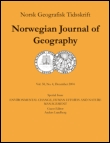
Norsk Geografisk Tidsskrift-Norwegian Journal of Geography
Unveiling the dynamics of our changing world.Norsk Geografisk Tidsskrift-Norwegian Journal of Geography, published by Routledge Journals, Taylor & Francis Ltd, is a pivotal peer-reviewed journal that has been instrumental in advancing the field of geography since its inception in 1926. With an esteemed Q2 ranking in both Earth and Planetary Sciences and Geography, Planning and Development categories, it serves as a vital resource for researchers, professionals, and students seeking to deepen their understanding of geographical phenomena. The journal's rich historical archive, covering significant periods in geography and environmental studies, showcases a diverse array of articles that reflect ongoing research trends and challenges within the field. Despite not offering Open Access, its impactful content remains accessible through institutional subscriptions, underscoring the journal's commitment to advancing geographical research and fostering scholarly dialogue. As it continues to publish high-quality research, Norsk Geografisk Tidsskrift stands as a key player in geographical scholarship, reinforcing its importance within the academic community.

Hungarian Geographical Bulletin
Advancing geographical scholarship for a global audience.Hungarian Geographical Bulletin, with ISSN 2064-5031 and E-ISSN 2064-5147, is a premier open-access journal published by the CSFK GEOGRAPHICAL INSTITUTE that has been an influential resource since 2009, dedicated to advancing the fields of geography, cultural studies, and agronomy. Located in Budapest, Hungary, this journal aims to disseminate high-quality research and engage a diverse audience of researchers, professionals, and students. The journal's reputation is underscored by its impressive category quartiles in 2023, ranking Q2 in Agronomy and Crop Science, Q1 in Cultural Studies, and Q2 across several other areas, including Geography and Earth and Planetary Sciences. With a Scopus ranking that places it in the top percentiles in multiple fields, the Hungarian Geographical Bulletin serves as an essential platform for innovative ideas and discussions that drive geographical scholarship and practice forward, specifically during its converged years from 2014 to 2024. Whether you are a seasoned researcher or an enthusiastic student, this journal presents a wealth of knowledge that is easily accessible due to its open-access format.
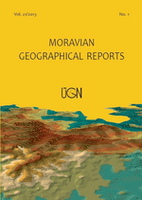
Moravian Geographical Reports
Exploring the Frontiers of Geography and Planetary ScienceWelcome to the Moravian Geographical Reports, an esteemed Open Access journal published by SCIENDO, dedicated to advancing the fields of Earth and Planetary Sciences as well as Geography, Planning and Development. Established in 1993, this journal has steadily built a reputation for disseminating high-quality research, evidenced by its 2023 Q2 ranking in both relevant categories and an impressive Scopus percentile ranking of 72. With a dedicated editorial board and an expanding global readership, the Moravian Geographical Reports serves as a vital platform for researchers, professionals, and students alike, fostering dialogue and collaboration across various dimensions of geographical and environmental studies. Since its shift to Open Access in 2013, it has significantly enhanced the accessibility and reach of its published works, making crucial research findings available to a broader audience. The journal continues to thrive as a significant contributor to the geographical and earth sciences discourse during its converged years from 1993 to 2024.

International Journal of Health Geographics
Innovating solutions at the intersection of health and geography.International Journal of Health Geographics is a premier open access journal published by BMC, dedicated to advancing the field of health geography by facilitating the dissemination of research that intersects health, the environment, and geographic information systems. Since its inception in 2002, the journal has become a vital resource for scholars and practitioners in public health, environmental science, and spatial data analysis, consistently ranking in the Q1 category across multiple disciplines, including Public Health, Business Management, and Computer Science. With an impressive Scopus ranking of #39/665 in Public Health and a notable 94th percentile standing, the journal is committed to publishing high-quality, impactful research that addresses current public health challenges through a geographic lens. Its open access model ensures that knowledge is readily available to researchers, policymakers, and the public, reinforcing its role as a key contributor to evidence-based decision-making in health and environmental policies. As it converges through 2024, the International Journal of Health Geographics continues to be an essential publication for advancing interdisciplinary understanding and promoting innovative solutions in health geography.
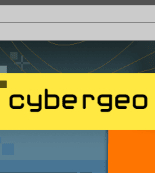
CyberGeo-European Journal of Geography
Navigating the Landscape of Geographical ResearchCyberGeo-European Journal of Geography, published by CYBERGEO, is a leading open-access journal that has been at the forefront of geographical research since its inception in 1996. With a dedicated focus on the multifaceted dimensions of geography, the journal aims to disseminate innovative and critical insights into geographical phenomena in Europe and beyond. The journal has established itself in the academic community, currently holding the Q3 quartile ranking in the Social Sciences (miscellaneous) category for 2023 and recognized within Scopus as #428 out of 604, placing it in the 29th percentile. CyberGeo publishes original research articles, thematic issues, and reviews that contribute to the advancement of geographical knowledge, making it an essential resource for researchers, professionals, and students alike. Situated in Paris, France, the journal embraces a truly international perspective and invites contributions that stimulate scholarly debate and further the understanding of spatial dynamics. By providing open access to its content, CyberGeo ensures that its research is accessible to a global audience, promoting knowledge sharing and collaborative exploration in the field of geography.
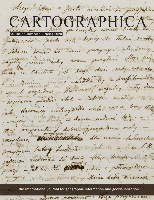
Cartographica
Mapping the Future of Geospatial SciencesCartographica is a premier academic journal dedicated to the field of cartography and geospatial sciences, published by University of Toronto Press Inc. This esteemed journal, with an ISSN of 0317-7173 and an E-ISSN of 1911-9925, serves as a critical platform for researchers and practitioners in the Earth-Surface Processes category, currently positioned in the Q3 quartile with a rank of #99 out of 179 in its field, reflecting its growing influence and relevance among peers. Since its inception in 1980, Cartographica has been committed to advancing the study of cartography through innovative research, critical analysis, and comprehensive review of developments in mapping technologies and applications within the geospatial sciences. Although not an open-access journal, it offers valuable insights and research findings that significantly enhance the understanding and practices within this specialized domain. Researchers, professionals, and students alike will find Cartographica to be an essential resource for staying abreast of the latest trends and methodologies in cartographic research.

Revue Internationale de Geomatique
Innovating Spatial Data Solutions for a Changing WorldRevue Internationale de Geomatique (ISSN: 1260-5875, E-ISSN: 2116-7060) is a prestigious journal published by TECH SCIENCE PRESS, dedicated to advancing the field of geomatics. This journal serves as a vital platform for disseminating significant research findings, cutting-edge methodologies, and innovative applications within the realm of spatial data and technology. With an emphasis on interdisciplinary studies, it fosters collaboration among researchers, professionals, and students across various domains, including environmental science, urban planning, and geographic information systems (GIS). Although not an open-access journal, Revue Internationale de Geomatique maintains a rigorous peer-review process ensuring the publication of high-quality articles that contribute to the evolving landscape of geomatics. Given its relevance and commitment to scholarly excellence, this journal is a crucial resource for advancing knowledge and practices in the ever-growing field of spatial information science.
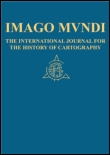
Imago Mundi-The International Journal for the History of Cartography
Navigating the depths of cartographic scholarship since 1935.Imago Mundi - The International Journal for the History of Cartography serves as a premier scholarly platform dedicated to the interdisciplinary exploration of cartography's rich history and its profound impact on our understanding of geography. Published by Routledge Journals, Taylor & Francis Ltd in the United Kingdom, this journal has been capturing pivotal cartographic scholarship since its inception, reaching a well-established audience of researchers, professionals, and students alike. Despite maintaining an open access limitation, Imago Mundi boasts a commendable impact factor within its field, demonstrating its importance in the arenas of both Earth and Planetary Sciences and Environmental Science. As part of its commitment to ongoing scholarship, the journal encompasses converged years from as far back as 1935, showcasing an extensive archive of research that enriches the field. Researchers looking to explore the intricate tapestries woven through the history of mapping will find Imago Mundi an invaluable resource as it continues to pave the way for innovative studies and discussions in cartographic history.
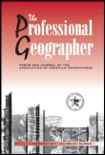
PROFESSIONAL GEOGRAPHER
Unveiling Insights in Geography and Earth-Surface ProcessesPROFESSIONAL GEOGRAPHER is a prominent journal in the fields of geography and earth-surface processes, published by Routledge Journals, Taylor & Francis Ltd. With a rich history dating back to 1949 and continuing through 2024, it serves as a vital platform for researchers, professionals, and students to explore and disseminate groundbreaking research and insights within the geographical sciences. The journal holds a respectable impact factor, placing it in the Q2 quartile for both Earth-Surface Processes and Geography, Planning and Development as of 2023, highlighting its importance in these critical academic areas. The journal ranks #273 out of 821 in Geography and Planning and #70 out of 179 in Earth and Planetary Sciences on Scopus, reflecting its robust contribution to advancing knowledge in social sciences. Although it does not currently offer open access options, it still provides invaluable content that influences pedagogy and research in geography. Its comprehensive scope invites a wide range of geospatial topics, encouraging interdisciplinary dialogue and collaboration across the global academic community.

Navigator-Subsidios para a Historia Maritima do Brasil
Preserving the Waves of Brazil's Cultural HeritageNavigating maritime history in Brazil, the journal Navigador-Subsidios para a Historia Maritima do Brasil serves as a pivotal platform for scholars, researchers, and enthusiasts alike. Published by the Ministerio Marinha, Serv Documentacao Geral Marinha, this esteemed journal has been offering Open Access content since 2005, ensuring that valuable insights into Brazil's rich maritime heritage are accessible to a global audience. Featuring a wide range of scholarly articles, the journal addresses various aspects of maritime history, including naval exploration, trade routes, and the cultural impact of seafaring on Brazilian society. By continually contributing to academic discourse, Navigador plays an essential role in preserving and promoting Brazilian maritime heritage, appealing to professionals in history, maritime studies, and cultural research.